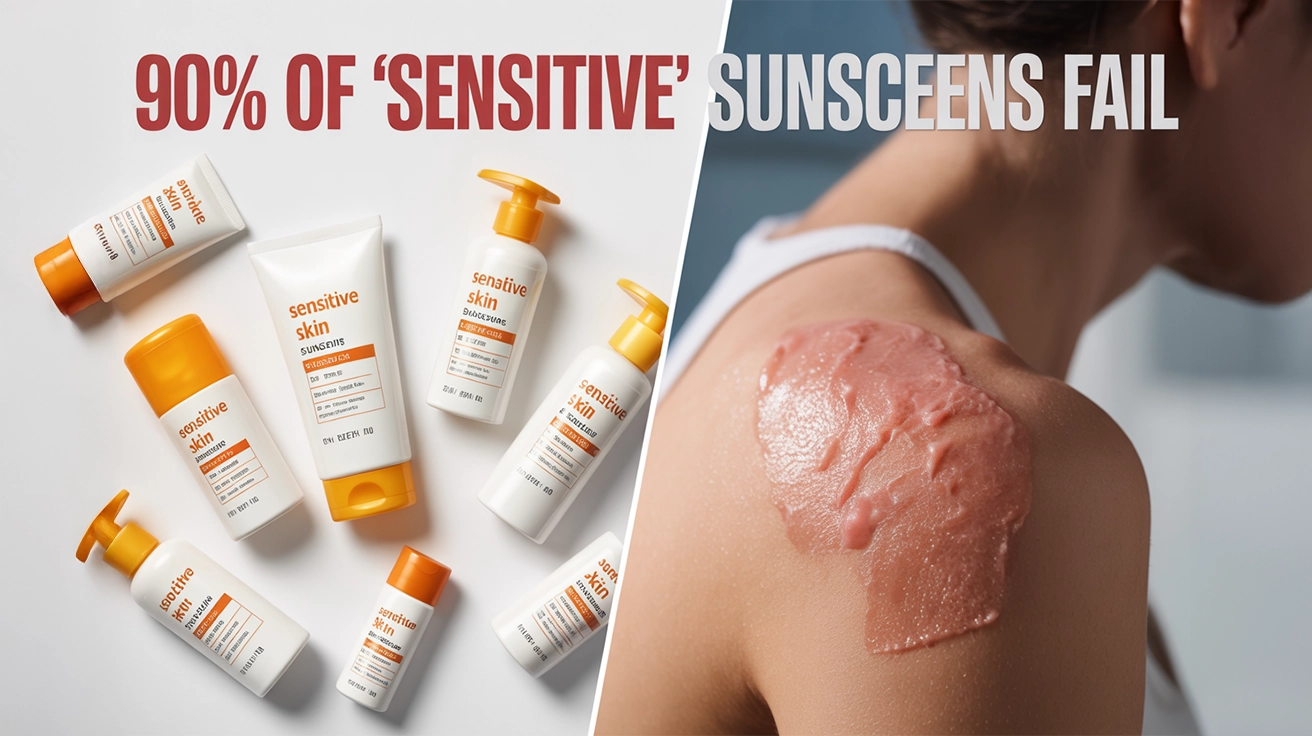

Protecting your skin from harmful UV rays is crucial, but it shouldn’t come at the cost of triggering acne flare-ups or causing irritation. The good news? There are sunscreens out there specifically formulated for your unique skin needs. In this guide, we’ll unveil the secrets to selecting the best sunscreen for sensitive skin and acne, helping you achieve that perfect balance of sun protection and skin-loving care.
Get ready to discover the key ingredients to look for, our top sunscreen recommendations, and expert application tips that will revolutionize your skincare routine. We’ll also address common concerns, ensuring you’re fully equipped to make the best choice for your skin. Say goodbye to sunscreen struggles and hello to happy, protected skin! 🎉
Sensitive skin can be tricky to manage, especially when it comes to sun protection. You may experience:
Redness and irritation
Burning or stinging sensations
Dryness and flaking
Increased reactivity to products
These characteristics make it crucial for you to choose skincare products, including sunscreen, with extra care.
If you have acne-prone skin, you’re likely familiar with these common triggers:
Excess oil production
Clogged pores
Bacteria buildup
Hormonal changes
Certain foods and medications
Understanding these triggers helps you make informed decisions about the products you use on your skin, including sunscreen.
Selecting the appropriate sunscreen for sensitive, acne-prone skin is vital for several reasons:
Protection without irritation
Avoiding breakouts
Maintaining skin health
| Sunscreen Type | Benefits for Sensitive, Acne-Prone Skin |
|---|---|
| Mineral | Less likely to cause irritation |
| Non-comedogenic | Won’t clog pores |
| Fragrance-free | Reduces risk of allergic reactions |
| Oil-free | Helps prevent excess sebum production |
By choosing a sunscreen that addresses your skin’s specific needs, you can protect yourself from harmful UV rays without exacerbating sensitivity or triggering acne flare-ups. Look for products labeled as “hypoallergenic” and containing gentle ingredients like zinc oxide. Remember, the right sunscreen will be your skin’s best friend in the fight against sun damage and breakouts.
When choosing a sunscreen for sensitive, acne-prone skin, understanding the difference between mineral and chemical sunscreens is crucial. Mineral sunscreens, also known as physical sunscreens, contain ingredients like zinc oxide and titanium dioxide. These create a protective barrier on your skin, reflecting harmful UV rays. Chemical sunscreens, on the other hand, absorb UV rays and convert them into heat.
For sensitive skin, mineral sunscreens are often the better choice. They’re less likely to cause irritation and are gentler on your skin. Here’s a quick comparison:
| Aspect | Mineral Sunscreens | Chemical Sunscreens |
|---|---|---|
| Active Ingredients | Zinc oxide, Titanium dioxide | Oxybenzone, Avobenzone, Octinoxate |
| Protection Method | Reflects UV rays | Absorbs UV rays |
| Irritation Risk | Lower | Higher |
| Visible on Skin | May leave a white cast | Usually invisible |
| Acne-Friendly | Generally non-comedogenic | Can clog pores |
To avoid exacerbating acne, look for non-comedogenic sunscreens. These formulas are designed not to clog your pores, reducing the risk of breakouts. Key features to look for include:
Oil-free formulations
Lightweight textures
Water-based or gel-based products
The best sunscreens for sensitive, acne-prone skin often include soothing ingredients to calm and protect your skin. Look for products containing:
Niacinamide
Aloe vera
Green tea extract
Chamomile
These ingredients can help reduce redness, inflammation, and irritation while providing added benefits for your skin.
When selecting a sunscreen, be wary of certain ingredients that may irritate sensitive skin or trigger acne. Steer clear of:
Fragrances
Alcohol
Essential oils
Oxybenzone (a common chemical sunscreen ingredient)
Parabens
By choosing a sunscreen with the right ingredients and avoiding potential irritants, you can effectively protect your sensitive, acne-prone skin without causing further issues. Next, we’ll explore some top sunscreen recommendations that meet these criteria.

When it comes to protecting your sensitive, acne-prone skin, EltaMD UV Clear Broad-Spectrum SPF 46 stands out as the top choice. This mineral-based sunscreen offers excellent protection without clogging pores or irritating your skin. Its lightweight formula contains zinc oxide and niacinamide, which help calm inflammation and reduce redness.
You don’t have to break the bank to find an effective sunscreen for your sensitive, acne-prone skin. Here are some affordable options:
Neutrogena Clear Face Liquid Lotion Sunscreen SPF 55
CeraVe AM Facial Moisturizing Lotion SPF 30
La Roche-Posay Anthelios Clear Skin Dry Touch Sunscreen SPF 60
For those days when you want a bit of coverage along with sun protection, try these tinted options:
| Sunscreen | SPF | Key Features |
|---|---|---|
| Australian Gold Botanical Tinted Face Sunscreen | 50 | Non-chemical, antioxidant-rich |
| MDSolarSciences Mineral Tinted Crème | 30 | Silky-smooth finish, water-resistant |
| Supergoop! CC Screen 100% Mineral CC Cream | 50 | Broad coverage, skincare benefits |
If you’re planning on swimming or sweating, opt for these water-resistant sunscreens:
Blue Lizard Sensitive Mineral Sunscreen SPF 50+
Coola Mineral Body Sunscreen Lotion SPF 50
Banana Boat Simply Protect Sensitive Sunscreen Lotion SPF 50+
Now that you’ve explored various options, consider sunscreens that offer extra skincare perks:
Murad City Skin Age Defense Broad Spectrum SPF 50: Contains vitamin C for brightening
Dermalogica Dynamic Skin Recovery SPF 50: Features peptides for anti-aging benefits
Paula’s Choice CALM Mineral Moisturizer SPF 30: Includes antioxidants for extra protection
With these recommendations, you’re well-equipped to choose the perfect sunscreen for your sensitive, acne-prone skin. Next, we’ll delve into application tips to ensure you’re getting the most out of your chosen sunscreen.
When it comes to sunscreen for sensitive, acne-prone skin, using the right amount is crucial. You should apply approximately 1/4 teaspoon (or 1.25 ml) of sunscreen to your face and neck. This amount ensures you’re getting the full SPF protection stated on the label.
| Body Part | Amount of Sunscreen |
|---|---|
| Face & Neck | 1/4 teaspoon |
| Each Arm | 1/2 teaspoon |
| Torso (Front & Back) | 1 teaspoon each |
| Each Leg | 1 teaspoon |
To maximize protection for your sensitive skin:
Dot the sunscreen all over your face
Gently pat and spread it evenly
Avoid rubbing vigorously to prevent irritation
Don’t forget often-missed areas like ears, neck, and hairline
You should reapply your sunscreen:
Every 2 hours when outdoors
After swimming or excessive sweating
Immediately after towel-drying
For acne-prone skin, consider using a powder SPF for touch-ups to avoid adding extra oils throughout the day.
When incorporating sunscreen into your skincare routine:
Apply any treatment products first
Follow with a lightweight, oil-free moisturizer
Wait 3-5 minutes for absorption
Apply your sunscreen last
This layering technique ensures your skin receives the benefits of all products while maintaining maximum sun protection. Remember, your sunscreen should always be the final step in your morning skincare routine before applying makeup.
When using sunscreen with makeup, it’s essential to find products that work well together. Here are some tips to ensure compatibility:
Choose a lightweight, non-greasy sunscreen as your base
Allow sunscreen to absorb for 3-5 minutes before applying makeup
Use a beauty blender or sponge for even application of foundation
| Sunscreen Type | Makeup Compatibility |
|---|---|
| Mineral | Excellent |
| Chemical | Good |
| Hybrid | Very Good |
You can effectively control excess shine and oiliness while protecting your skin:
Opt for oil-free or mattifying sunscreens
Look for ingredients like silica or clay that absorb excess oil
Use blotting papers throughout the day to remove excess oil
Consider a powder sunscreen for touch-ups without adding more moisture
To avoid breakouts caused by sunscreen:
Choose non-comedogenic formulas specifically designed for acne-prone skin
Look for oil-free and fragrance-free options
Consider mineral sunscreens with zinc oxide, which has anti-inflammatory properties
Cleanse your face thoroughly at the end of the day to remove all sunscreen residue
If you have a darker skin tone, you can minimize the white cast often left by mineral sunscreens:
Look for tinted mineral sunscreens that match your skin tone
Choose nano-sized zinc oxide or titanium dioxide formulations
Apply the sunscreen in thin layers, allowing each layer to absorb before adding more
Consider chemical sunscreens, which typically don’t leave a white cast
By addressing these common concerns, you can find a sunscreen that not only protects your sensitive, acne-prone skin but also integrates seamlessly into your daily skincare and makeup routine.
Choosing the right sunscreen for sensitive, acne-prone skin is crucial for maintaining healthy, protected skin while preventing breakouts. By understanding your skin’s unique needs and looking for key ingredients like zinc oxide and niacinamide, you can find a sunscreen that offers both effective sun protection and skincare benefits.
Remember to apply your chosen sunscreen generously and frequently, especially when spending time outdoors. Don’t let common concerns about sunscreen use deter you from protecting your skin. With the right product and proper application, you can enjoy the sun safely while keeping your sensitive, acne-prone skin happy and healthy.
Your Ultimate Guide to Healthy, Glowing Skin – Expert Tips, Honest Reviews & Skincare Secrets!
Sign up our newsletter to get update tips, honest reviews & skincare secrets!